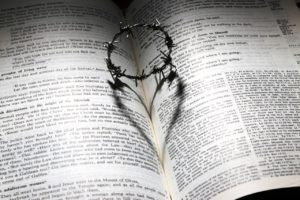 “But when you fast, put oil on your head and wash your face, so that it will not be obvious to others that you are fasting, but only to your Father, who is unseen; and your Father, who sees what is done in secret, will reward you.” (Mt 6:17-18)
“But when you fast, put oil on your head and wash your face, so that it will not be obvious to others that you are fasting, but only to your Father, who is unseen; and your Father, who sees what is done in secret, will reward you.” (Mt 6:17-18)
As Easter draws closer, we look for ways to deepen our spiritual life and draw closer to Jesus. Fasting is one spiritual discipline we can use to do this.
When fasting, we give up something we enjoy – food, liquids other than water, social media, TV or movies – and we use that time to study Scripture and pray.
Fasting can be done any time, not just at Easter or as part of Lent. Some people fast before making a big decision (see Acts 13:2-3; 14:23). Some people fast at the beginning of the year to reset their minds as the new year begins.
Fasting is one of the most difficult spiritual disciplines in which to participate. Why is fasting harder than, say, praying? Fasting involves physical weakness in order to achieve spiritual strength. As our bodies weaken, we rely more on God (2 Cor 12:9-11). In our physically weakened condition, we may notice things rising to the surface that we’ve spent many hours, days, or even years avoiding. Where we typically fill ourselves with food or entertainment, now we must face those issues.
Fasting isn’t just about abstaining from food (1 Cor 7:3-5). I’ve fasted from a variety of things – TV shows, negative words and criticism, caffeine – but I’ve never done a full food fast. For one thing, I get a migraine when I skip a meal, so I’m not sure how to fast from food safely. It’s something I’d like to explore.
What can we learn about fasting from the Scriptures?
- Fasting is to be for a specific period of time (1 Corinthians 7:5).
- Fasting is a form of worship (Luke 2:37).
- Fasting is personal. We receive instructions on how to fast in Matthew 6:16-18.
- Fasting is a way to show repentance for our sins (Daniel 9:3-5).
- Fasting is a way to intervene for others (Esther 4:16).
Breaking a fast early may make us feel guilty. But fasting wasn’t designed to create feelings of guilt for not measuring up. It’s not a goal to achieve or box to check. It’s a way to know God better. He looks at our hearts, and he gives us many opportunities to get it right.
Do you fast? And if you do, how do you choose how long and from what you will fast?
Dear Jesus, thank you for the opportunity to practice spiritual disciplines that draw us closer to you, including fasting. Help me to use my time to know you better. Amen.